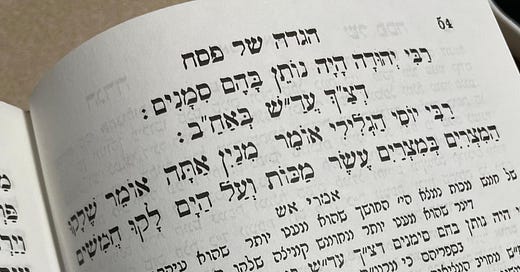In this week’s Orthodox Conundrum Podcast, I asked eight of my guests from the past year to offer ideas about the Seder that are meaningful to them. The following is an adaptation of David Bloom’s dvar Torah on the section of the Haggadah that suggests that there were far more plagues in Egypt and at the Red Sea than we normally assume.
During the Maggid section of the Haggadah, the story of the Exodus begins in a straightforward manner starting from Vayered Mitzraima (“[Jacob] went down to Egypt”) according to the progression of events that we all know well from Sefer Shemot, up until the point that we conclude with the ten plagues.
Immediately after we mention the plagues, we begin a section that doesn’t resonate as part of the Exodus narrative:
Rabbi Yosi HaGelili says: How do we know the Egyptians were struck with 10 plagues in Egypt and while on the Sea they were stuck with 50 plagues?
After that introduction, the Haggadah continues with Rabbi Eliezer who, basing himself upon a verse from Tehilim, argues that the Egyptians were struck by forty plagues in Egypt, and two hundred at the Red Sea; after which Rabbi Akiva concludes that they were afflicted with fifty plagues in Egypt and another 250 at the Sea.
As a somewhat recent av shakul - the father of a son killed in battle - I have a new perspective. Many "standards" have taken on new meanings and are imbued with added significance; when I hear this part of the Haggadah, I am struck by the sense that Rabbi Yosi HaGelili, Rabbi Eliezer, and Rabbi Akiva are describing a scene of absolute chaos.
This quantity of miracles does not occur in a vacuum; it's a response to something specific. God gives us miracles in order to relieve us from distress - and this multitude of miracles in such a short period of time indicates that God was striking the enemy of the Jewish people in order to prevent a greater calamity.
In my opinion, these three great rabbis are describing a scene of a battle, or a potential pogrom.
The quantity of miracles mentioned is reminiscent of the numerous personal stories recounted here in Israel from civilians and soldiers about how they were miraculously saved…
…a building collapsed but no one was hurt…
…a bullet just barely missed or struck in a non-lethal way…
…the examples are endless.
When we zoom out and talk about the great moments of salvation in Jewish history - like Chanukah, or the Six Day War, or the Exodus from Egypt - we tend to speak of the great miracles and discuss the salvation of the Jewish people.
But when we zoom in and look at the details as Rabbi Yosi HaGelili does… when we focus on a single battle… when we look carefully at the individuals and soldiers who were there… we begin to understand that while the nation was victorious, there were also myriad instances of suffering.
Not everyone was saved by a miracle.
So where does that leave us? Why wasn't my family granted a miracle? How come Gavriel won't be joining us for the Seder this year?
How am I supposed to move on and celebrate the miracles and salvation of the Jewish People?
This is where faith and gratitude serve as our guide and salvation.
Immediately after Rabbi Akiva states his opinion regarding the quantity of miracles, the Haggadah continues with the words, Kama ma’alot tovot laMakom aleinu - “How many levels of favors has the Omnipresent bestowed upon us!”
Importantly, the Haggadah uses the same vague name of God – HaMakom, or Omnipresent – that is used when exiting the house of a mourner. For both in the moments of greatest celebration and the instances of grief, we need to look to our faith and recognize that both are part of God’s unknowable plan.
My wife Jennifer, in her eulogy for Gavriel, said:
"Gavriel, Thank you for 27 fun, amazing years."
This is something that we are truly grateful for.
And this is where Dayenu starts.
It lists a number of intermediate steps – and concludes that for each step in our lives, and in the continuation of the Jewish People, we need to have gratitude – and even if we do not merit to reach the next step, we need to appreciate what we did receive:
If He had brought us out from Egypt, and had not carried out judgments against them - dayenu, it would have sufficed us!
Dayenu concludes with the following rousing statement:
Thus how much more so should we be grateful to the Omnipresent [HaMakom] for the doubled and redoubled goodness that He has bestowed upon us!
Now that we have reached this state of faith and gratitude, we can carry out the words of the Mishna:
Therefore we are obligated to thank, praise, glorify, extol, exalt, honor, bless, revere, and laud the One who performed for our forefathers and for us all these miracles: He took us out from slavery to freedom, from sorrow to joy, from mourning to a Festival, from darkness to a great light, and from enslavement to redemption. And we will say before Him: Halleluya.
Once we have reached a state of gratitude and restored faith, we are ready to continue with the next section of Pesach, matzah, u’maror.
Chag sameach!




Most of the classic torah on Dayenu assumes that OF COURSE it would *not* have been enough to take us to the sea but not across it, or to bring us to Sinai and not give us the Torah.
David takes Dayenu at its face value, and powerfully. Thank you for sharing.
Powerful, thanks for sharing